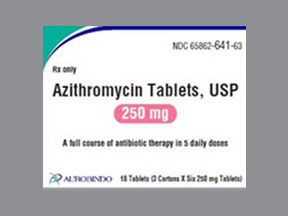
Azithromycin Coupons & Savings Card – Discount Prices from $4.74
Generic for: Zithromax, Zithromax z-pak, Zithromax tri-pak
Azithromycin is a macrolide antibiotic used to treat a variety of bacterial infections in both adults and children. It effectively manages conditions such as strep throat, sinus infections, pneumonia, and various skin infections. In adults, it is also used for treating genital infections. Azithromycin functions by inhibiting the growth of bacteria, preventing them from producing essential proteins needed for their survival and spread. This medication is not effective against viral infections like the common cold or flu. It's important to use antibiotics responsibly to prevent decreased effectiveness. Azithromycin is typically taken orally once daily for a course of 3 to 5 days, depending on the infection type. Some common side effects include diarrhea, stomach pain, and nausea. This medication is not intended for use in children under specific conditions without professional guidance. Always consult a healthcare professional before starting any medication.
Our coupons are free to use. Before paying, show the pharmacist your Azithromycin savings card to get your free discount. Use our filters below to edit the prescription box to match your needs. The Azithromycin prices will update based on your prescription needs. Above our Azithromycin coupons, you can change your location to see pharmacy prices and costs in other areas. We're here to help you buy Azithromycin at the lowest price with our prescription discount card.
My prescription
Edit
250MG, Azithromycin (6 Tablets)
Select pharmacy

CVS
$19.05
COUPON PRICE
Walmart
$4.74
COUPON PRICE
Walgreens
$10.86
COUPON PRICE
Albertsons
$12.54
COUPON PRICEAzithromycin savings card
Show this card to your pharmacist
Walmart
$4.74
BIN
ID
PCN
GRP
019876
LHE1314BBD
CHIPPO
LHX
Powered by
Azithromycin is a macrolide antibiotic used to treat a variety of bacterial infections in both adults and children. It effectively manages conditions such as strep throat, sinus infections, pneumonia, and various skin infections. In adults, it is also used for treating genital infections. Azithromycin functions by inhibiting the growth of bacteria, preventing them from producing essential proteins needed for their survival and spread. This medication is not effective against viral infections like the common cold or flu. It's important to use antibiotics responsibly to prevent decreased effectiveness. Azithromycin is typically taken orally once daily for a course of 3 to 5 days, depending on the infection type. Some common side effects include diarrhea, stomach pain, and nausea. This medication is not intended for use in children under specific conditions without professional guidance. Always consult a healthcare professional before starting any medication.
Our coupons are free to use. Before paying, show the pharmacist your Azithromycin savings card to get your free discount. Use our filters below to edit the prescription box to match your needs. The Azithromycin prices will update based on your prescription needs. Above our Azithromycin coupons, you can change your location to see pharmacy prices and costs in other areas. We're here to help you buy Azithromycin at the lowest price with our prescription discount card.
More prescriptions for upper respiratory infection
coupons from$4.93Save 82%
coupons from$61.15Save 35%
coupons from$12.66Save 86%
coupons from$120.90Save 78%
coupons from$552.70Save 67%
coupons from$2314.30Save 17%
coupons from$1.01Save 99%
coupons from$5.35Save 79%
More prescriptions for upper respiratory infection
Erythromycin Save 82%coupons from $4.93
Ery Save 35%coupons from $61.15
Cefdinir Save 86%coupons from $12.66
Ximino Save 78%coupons from $120.90
Oracea Save 67%coupons from $552.70
Tetracycline Hcl Save 17%coupons from $2314.30
Clindamycin Hcl Monohydrate Save 99%coupons from $1.01
Vibramycin Save 79%coupons from $5.35
Azithromycin (Zithromax) dosage forms
Use our Azithromycin (Zithromax) 250MG coupon with prices from $1.01 for 6 Tablets. You can also use our Azithromycin (Zithromax) 250MG coupon with prices from $1.01 for 4 Tablets. We have a Azithromycin (Zithromax) 250MG coupon with prices from $1.01 for 7 Tablets. You can use our Azithromycin (Zithromax) 250MG coupon with prices from $1.01 for 8 Tablets.
Dosage Quantity Price from Per unit 250MG 6 Tablets $1.01 $0.17 250MG 4 Tablets $1.01 $0.25 250MG 7 Tablets $1.01 $0.14 250MG 8 Tablets $1.01 $0.13 250MG 30 Tablets $48.18 $1.61 250MG 60 Tablets $115.34 $1.92 500MG 2 Tablets $1.01 $0.51 500MG 3 Tablets $1.01 $0.34 500MG 5 Tablets $1.01 $0.20 500MG 10 Tablets $11.93 $1.19
| Dosage | Quantity | Price from | Per unit |
|---|---|---|---|
| 250MG | 6 Tablets | $1.01 | $0.17 |
| 250MG | 4 Tablets | $1.01 | $0.25 |
| 250MG | 7 Tablets | $1.01 | $0.14 |
| 250MG | 8 Tablets | $1.01 | $0.13 |
| 250MG | 30 Tablets | $48.18 | $1.61 |
| 250MG | 60 Tablets | $115.34 | $1.92 |
| 500MG | 2 Tablets | $1.01 | $0.51 |
| 500MG | 3 Tablets | $1.01 | $0.34 |
| 500MG | 5 Tablets | $1.01 | $0.20 |
| 500MG | 10 Tablets | $11.93 | $1.19 |
| 500MG | 12 Tablets | $18.11 | $1.51 |
